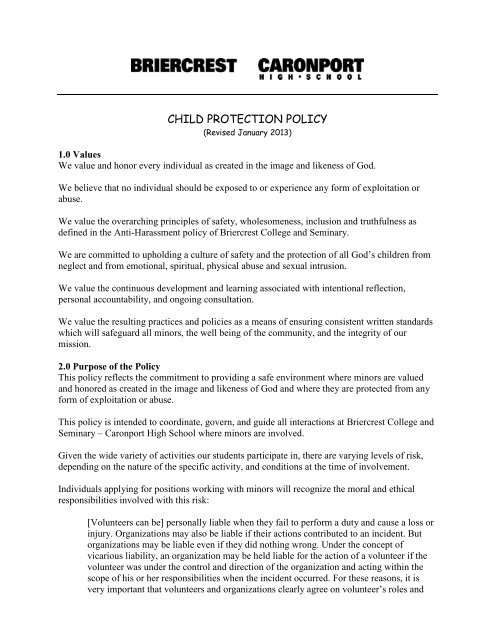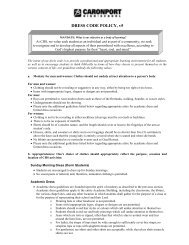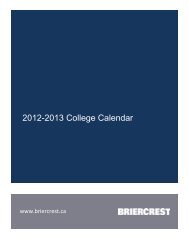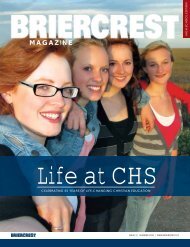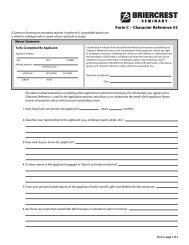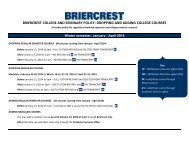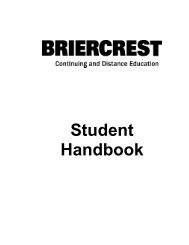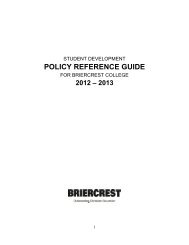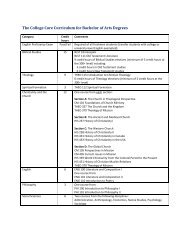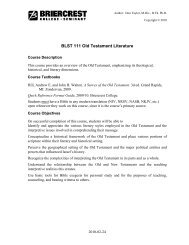CHILD PROTECTION POLICY - Briercrest College and Seminary
CHILD PROTECTION POLICY - Briercrest College and Seminary
CHILD PROTECTION POLICY - Briercrest College and Seminary
You also want an ePaper? Increase the reach of your titles
YUMPU automatically turns print PDFs into web optimized ePapers that Google loves.
<strong>CHILD</strong> <strong>PROTECTION</strong> <strong>POLICY</strong><br />
(Revised January 2013)<br />
1.0 Values<br />
We value <strong>and</strong> honor every individual as created in the image <strong>and</strong> likeness of God.<br />
We believe that no individual should be exposed to or experience any form of exploitation or<br />
abuse.<br />
We value the overarching principles of safety, wholesomeness, inclusion <strong>and</strong> truthfulness as<br />
defined in the Anti-Harassment policy of <strong>Briercrest</strong> <strong>College</strong> <strong>and</strong> <strong>Seminary</strong>.<br />
We are committed to upholding a culture of safety <strong>and</strong> the protection of all God’s children from<br />
neglect <strong>and</strong> from emotional, spiritual, physical abuse <strong>and</strong> sexual intrusion.<br />
We value the continuous development <strong>and</strong> learning associated with intentional reflection,<br />
personal accountability, <strong>and</strong> ongoing consultation.<br />
We value the resulting practices <strong>and</strong> policies as a means of ensuring consistent written st<strong>and</strong>ards<br />
which will safeguard all minors, the well being of the community, <strong>and</strong> the integrity of our<br />
mission.<br />
2.0 Purpose of the Policy<br />
This policy reflects the commitment to providing a safe environment where minors are valued<br />
<strong>and</strong> honored as created in the image <strong>and</strong> likeness of God <strong>and</strong> where they are protected from any<br />
form of exploitation or abuse.<br />
This policy is intended to coordinate, govern, <strong>and</strong> guide all interactions at <strong>Briercrest</strong> <strong>College</strong> <strong>and</strong><br />
<strong>Seminary</strong> – Caronport High School where minors are involved.<br />
Given the wide variety of activities our students participate in, there are varying levels of risk,<br />
depending on the nature of the specific activity, <strong>and</strong> conditions at the time of involvement.<br />
Individuals applying for positions working with minors will recognize the moral <strong>and</strong> ethical<br />
responsibilities involved with this risk:<br />
[Volunteers can be] personally liable when they fail to perform a duty <strong>and</strong> cause a loss or<br />
injury. Organizations may also be liable if their actions contributed to an incident. But<br />
organizations may be liable even if they did nothing wrong. Under the concept of<br />
vicarious liability, an organization may be held liable for the action of a volunteer if the<br />
volunteer was under the control <strong>and</strong> direction of the organization <strong>and</strong> acting within the<br />
scope of his or her responsibilities when the incident occurred. For these reasons, it is<br />
very important that volunteers <strong>and</strong> organizations clearly agree on volunteer’s roles <strong>and</strong>
esponsibilities, <strong>and</strong> the organization’s policies <strong>and</strong> procedures. (The People’s Law<br />
School, 2000, P. 7)<br />
In our context, we underst<strong>and</strong> that relationships are foundational in providing a road for spiritual,<br />
personal, <strong>and</strong> academic progress that is based on the life <strong>and</strong> teachings of Jesus Christ. It should<br />
be understood from the outset that defining healthy safeguarding practices <strong>and</strong> polices is not<br />
meant to undermine the importance of personal contact. Rather, safeguarding practices <strong>and</strong><br />
polices are meant to assist all employees <strong>and</strong> volunteers to care appropriately, guided by<br />
consistent written st<strong>and</strong>ards which will safeguard all minors, the well being of the community,<br />
<strong>and</strong> the integrity of our mission.<br />
3.0 Expectations<br />
<strong>Briercrest</strong> <strong>College</strong> <strong>and</strong> <strong>Seminary</strong> requires that any individual who is not currently employed by<br />
BCS or is not a current student in good st<strong>and</strong>ing, wishing to work with minors in any capacity,<br />
complete the following package <strong>and</strong> submit for approval to the appropriate department.<br />
Those individuals currently employed by BCS or as current students in good st<strong>and</strong>ing, wishing to<br />
work with minors in any capacity, will complete the Statement of Underst<strong>and</strong>ing <strong>and</strong> submit to<br />
the appropriate department.<br />
<strong>Briercrest</strong> <strong>College</strong> <strong>and</strong> <strong>Seminary</strong> expects that all those approved to work with minors will abide<br />
by the applicable guidelines <strong>and</strong> procedures set out by <strong>Briercrest</strong> <strong>College</strong> <strong>and</strong> <strong>Seminary</strong> as<br />
articulated <strong>and</strong> referenced within this policy.<br />
4.0 Privacy <strong>and</strong> Confidentiality<br />
<strong>Briercrest</strong> <strong>College</strong> <strong>and</strong> <strong>Seminary</strong> values the privacy <strong>and</strong> confidentiality of all our students. Those<br />
responsible to ensure healthy safeguarding practices in our work with minors will respect the<br />
privacy of all minors as it pertains to the forwarding or disclosure of personal information,<br />
special needs, medications, etc.. Only information necessary to the appropriate care of the minor<br />
will be disclosed in order to provide a safe <strong>and</strong> caring experience for all. In cases where<br />
disclosure is necessary, the guidelines of what information, for what purpose, <strong>and</strong> to whom shall<br />
be considered, in consultation with the appropriate supervisor. It is the responsibility of the<br />
supervisor to facilitate appropriate disclosure with parties outside of <strong>Briercrest</strong> <strong>College</strong> <strong>and</strong><br />
<strong>Seminary</strong> - Caronport High School.<br />
5.0 Compliance <strong>and</strong> Acknowledgement of Risk<br />
It is expected that employees <strong>and</strong> volunteers will comply with the safeguarding practices <strong>and</strong><br />
policies referenced in this resource; recognizing that despite our best intentions, any form of<br />
leadership with minors places the leader at risk of offending. Self awareness <strong>and</strong> self monitoring<br />
of compliance are key to developing <strong>and</strong> maintaining consistent safeguarding practices.<br />
It is important to be aware that compliance is also related to prior training <strong>and</strong> previous<br />
opportunities to reflect on the policies <strong>and</strong> their implications. Those with less training will adhere<br />
closely to the stated practices <strong>and</strong> policies. Those individuals identified as having supervisory<br />
roles will assist with adherence <strong>and</strong> interpretation of the policy.<br />
6.0 Accountability <strong>and</strong> Reporting
<strong>Briercrest</strong> <strong>College</strong> <strong>and</strong> <strong>Seminary</strong> will work with volunteers to identify the appropriate supervisor<br />
specific to their placement <strong>and</strong> level of involvement.<br />
<strong>Briercrest</strong> <strong>College</strong> <strong>and</strong> <strong>Seminary</strong> values the continuous development <strong>and</strong> learning associated<br />
with intentional reflection, personal accountability, <strong>and</strong> ongoing consultation with supervisors.<br />
Employees <strong>and</strong> volunteers should regularly consider the following questions:<br />
What things could be potential risks<br />
What is the probability that something will go wrong<br />
What is the seriousness of the risk<br />
What can be done to lower or eliminate the risk<br />
Volunteers will recognize that poor conflict management skills, drug or alcohol use, the presence<br />
of addictions <strong>and</strong> a prior history of unaddressed personal abuse represent unique situations that<br />
will require supervisor input. Volunteers are responsible to inform supervisors of anything that<br />
might hinder their ability to serve.<br />
Volunteers are expected to inform <strong>and</strong> discuss with their supervisors all concerns relating to their<br />
responsibilities <strong>and</strong> placements. Specifically, volunteers are responsible to bring to the attention<br />
of their immediate supervisor incidents involving the following:<br />
Non-compliance with the policy<br />
Situations where the volunteer feels they are unable to comply<br />
A potential risk has occurred/been identified<br />
Awareness that an allegation has or is likely to be received<br />
All critical or emergency situations involving a minor<br />
In addition, supervisors should be made aware of the following situations:<br />
If a minor is not cooperating with you or exhibits inappropriate behaviour despite your<br />
interventions.<br />
If a parent or any other adult is interfering with your role.<br />
If you encounter a difficult situation that you are unsure of how to h<strong>and</strong>le or if you<br />
believe that a minor requires attention from a health or mental health professional.<br />
If a minor acknowledges any suicidal or self harm thoughts or intentions. This should be<br />
attended to according to the CHS Suicide Intent Response Protocol.<br />
If a minor acknowledges any thoughts, intentions or threats of violence. The appropriate<br />
supervisor will be notified immediately.<br />
If a minor discloses any form of child abuse, sexual intrusion or molestation.<br />
If you have any significant interaction with a minor relating to disciplinary actions.<br />
7.0 Safeguarding Practices<br />
The following guidelines are designed to articulate healthy safeguarding practices <strong>and</strong> to enhance<br />
the care of minors.<br />
Volunteers meeting with minors should do so in public places, in groups, <strong>and</strong> avoid<br />
situations of closed room one-on-one interaction in a private setting.
Physical touch can have many meanings both for the person initiating touch <strong>and</strong> for the<br />
receiving individual. As a guideline, employees <strong>and</strong> volunteers should avoid any<br />
physically touch in non-public settings. In public places, employees <strong>and</strong> volunteers<br />
should use careful discretion <strong>and</strong> appropriate communication before initiating any<br />
physical touch with minors.<br />
In situations of billeting <strong>and</strong> overnight accommodations, appropriate supervision should<br />
be arranged that does not require individual employees <strong>and</strong> volunteers staying in the<br />
same room as a minor.<br />
Approved male <strong>and</strong> female staff/volunteers are required for all off site co-ed activities<br />
involving minors.<br />
Private vehicles may be used for special purposes if the numbers of minors involved does<br />
not warrant the use of school vehicles. The event must be school approved.<br />
Only employees <strong>and</strong> approved driver volunteers, parents <strong>and</strong> guardians may<br />
convey students. Approval to transport minors in personal vehicles requires the<br />
driver to have completed the Vehicle Operator Application Form.<br />
It is recommended that employees <strong>and</strong> approved driver volunteers authorized to<br />
use their personal vehicle have third party liability insurance of at least two<br />
million dollars.<br />
All employees <strong>and</strong> approved driver volunteers, parents <strong>and</strong> guardians will have<br />
access to cellular or satellite phone or other communication device when transporting<br />
minors.<br />
In situations where there has been a physical injury or a report necessitated under the<br />
guidelines of this policy, the volunteer will be required to meet with their supervisor <strong>and</strong><br />
complete an incident report.<br />
Emergency situations will be responded to according to the CHS Emergency Response<br />
Procedure. Contact with parents will be facilitated by the immediate supervisor.<br />
8.0 Orientation<br />
Those approved under the Volunteer Application process to work with minors will be required to<br />
complete an orientation process.
<strong>CHILD</strong> <strong>PROTECTION</strong> <strong>POLICY</strong><br />
Application Contacts<br />
Department Contact Volunteer Involvement<br />
CHS Athletics Shane Sowden Team involvements; coaching<br />
staff, chaplaincy, Team travel<br />
CHS Events Sue Brauer Dessert Theatre, Ski Trip,<br />
West Ed. Mall Trip<br />
BCS Athletics Nigel Mullan Team involvements; coaching<br />
staff, chaplaincy, Team travel<br />
BCS-CHS Student Life Lori MacLeod BCS-CHS Residence Life,<br />
BCS Core Events Vi Thiessen Musical, 2819, Serve, YQ<br />
Health Services Cheryl Kozun Volunteer Drivers<br />
YQ Tech Crew Matt Delong Tech Crew


